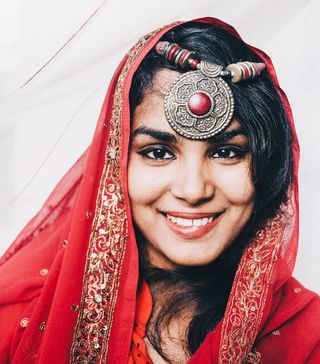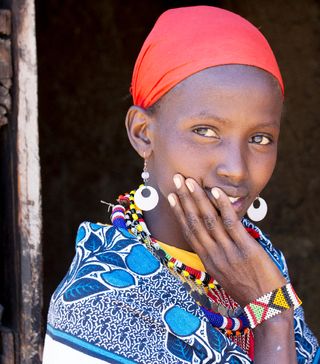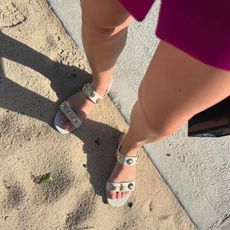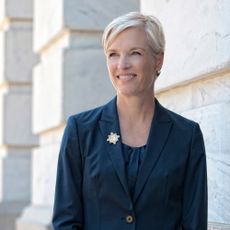11 Women From India, Haiti, and More Share One Thing You Can Do to Empower Women

Every year since 1909, women around the world have celebrated International Women's Day in an effort to, as the organization's website states, "celebrate the social, economic, cultural, and political achievement of women." Of course, advocating for the rights and empowerment of other women isn't something that starts and ends with International Women's Day, but since the mid-1970s, the UN has formally recognized March 8 as a time to call attention to it, and thousands of brands, nonprofits, and individuals use the event as an opportunity to jump-start women's rights initiatives. This is all wonderful, obviously, but these ideas are also very big, and sometimes the overwhelming concept of "how to support women's rights" can be hard to wrap your head around. On an occasion as largescale as International Women's Day, how can everyday women figure out where to focus their energy and how to lend their support to the sisterhood in a way that makes sense for them?
For some guidance, we got in touch with 11 inspiring women across the globe—from Argentina, Kenya, Israeli, Haiti, Australia, and beyond—and asked them to share with us the efforts they make in their daily lives, both big and small, to help empower other women. Some of their actions are as grand as starting nonprofit organizations (which you can totally donate to!) and some are as simple as lending daily support to fellow women through verbal affirmations. Whatever commitments you're able to make to female empowerment, we hope you find some inspiration here.
WHAT FEMALE EMPOWERMENT LOOKS LIKE AROUND THE WORLD

1. Fighting for women's reproductive health in India.
"Giving girls autonomy over their bodies and the power to make decisions related to their sexual and reproductive health (SRH) is one of the most significant ways to empower them. Knowledge of SRH is key for girls to achieve this self-sufficiency.
"Unfortunately, in India, the conversation around SRH is limited due to the nature of the subject, which is still tabooed and stigmatized in India. For example, menstruation continues to be considered an impure event, and conversation about contraceptives is still hushed. These challenges put Indian girls in precarious positions that sometimes leads them to drop out of school, have an early marriage, or have an unplanned pregnancy.
"Working on the Kissa Kahani project [spearheaded by University of Chicago] in India motivates and inspires me to continue investing my efforts to educate girls in my community with SRH information. The project is working toward bridging the information gap and empowering young girls to reach their full potential. The efforts of myself and the entire Kissa Kahani team are aimed at ensuring that all young women and girls have the ability to make informed sexual and reproductive health decisions that allow them to take control of their own bodies and lives." — Simeen Kaleem, New Dehli, India
2. Enhancing elderly women's quality of life in Mexico.
"I'm an international development professional living in Oaxaca, and I'm committed to ensuring the quality and success of the everyday work being done for the elderly in Santo Domingo Tonalá with an organization I founded called Nija'nu. I developed all the project activities in our organization. I do most of the fundraising, train our team, network with the local government, we put together awareness-raising events on the plight of elderly, and more.
"We've been able to make quite a difference in many elders' lives, bringing sunshine to homes and lives that were sad and dark. Elders love coming to our activities. With having enough food on their plate (due to the food aid we provide), they can now take care of their hearts and health through us." — Karen Rasmussen, Oaxaca, Mexico
3. Advocating for women's hearing health in Kenya.
"For decades now, women in Africa were viewed as the weaker sex; in fact, in many communities, women were counted as children. Women never had their own voice nor did they use their own mind, as decision-making was a 'man's' job, with the female being handed tasks that involved being in the home and childbearing. Eventually, change did come but not without challenges, and the struggle to emancipate us from these beliefs and empower women faced numerous challenges from both men and a section of women.
"As a country coordinator with Starkey Hearing Foundation [a global foundation that provides complimentary hearing aids to people in need] in my home country of Kenya, my path has crossed with women both within the workplace as well as with the patients we provide the gift of hearing to. Hearing loss is not visible nor does it hurt, and thus, women living with this impairment have previously not been given the attention they deserve … [but] it is evident in the patients who walk through our doors that something has been amiss. The women we work with are the ones we see mostly coming back to the center for follow-up even just to have their hearing aids checked because the thought of being relegated back to a world of no sound is a place they have vowed not to return to for they are that pillar holding everyone together in the home." — Perez Onduru, Nairobi, Kenya
4. Making period products available to homeless women in Australia.
"Domestic and family violence is the principal cause of homelessness for women and their children in Australia. There are thousands of women and young girls living in shelters across Australia that have little money and consequently cannot afford to purchase feminine hygiene products. I launched Modibodi [a period-proof underwear brand] in my native Australia to help women across the globe, and we wanted to create a program that would allow for others to join us and help impact the lives of women. This year, Modibodi launched Give a Pair, allowing for shoppers to purchase virtual panties that would be donated to shelters across Australia. Every $20 that is given equals one virtual pair of Modibodi underwear, and for every 'virtual pair' purchased, Modibodi will donate two pairs of physical underwear to shelters and to women in need across Australia." — Kristy Chong, New South Wales, Australia

5. Promoting body inclusivity in Argentina.
"I’ve been a body image activist for several years. The catalyst for my career in activism? Residing in Buenos Aires. After leaving my province of Canada and settling in Argentina, I realized that size discrimination runs rampant throughout the Argentine fashion industry, with most retailers choosing to cater to small-size clientele. As an average-size woman, I have experienced what larger bodies have always had to contend with: being excluded from the world of fashion for being ‘too fat.’ Consequently, in 2011, I founded the NGO AnyBody Argentina, the Argentine chapter of Endangered Bodies, an international movement that challenges the culture that foments body hatred. Since then, my team of volunteers and I have created countrywide campaigns that have paved the way for ongoing collaborations with international, national, and local clothing brands that encourage and support a more inclusive fashion industry. We have also collaborated with lawmakers in an attempt to legislate against sizeist practices in the world of fashion, in addition to engaging in educational activities with the public to spread the message of body acceptance among all Argentines, especially girls and women." — Sharon Haywood, Buenos Aires, Argentina
6. Lifting up women's voices in Israel.
"I am active in Women Wage Peace, a grassroots movement to promote a diplomatic agreement with the Palestinians and ensure women's participation in matters of security and peace. And on a completely different level: When I teach human rights in elementary and high schools here, disproportionately, it's boys who raise their hands to talk in class; I make sure that girls also take part in the discussion." — Jessica Montell, Jerusalem, Israel
7. Shopping for ethically made fashion in Canada.
"One incredible way women can empower other women is by supporting fair trade and ethical fashion. Roughly 80% of garment workers are women, and many are the main income earner in their family. Clothing factories also have many issues with discrimination, harassment, and abuse, and many women, unfortunately, experience sexual violence from male supervisors.
"However there are also wonderful brands who pay fair, living wages, have ethical policies to protect employees, and work to empower women and their communities. By supporting brands like this, you are helping provide safe and fair employment to women around the world! Raven + Lily, Naja, People Tree, and Studio JUX are just a few examples of the many incredible brands." — Verena Erin Polowy, Vancouver, Canada
8. Providing women with jobs in Haiti.
"I moved to Haiti after the 2010 earthquake to volunteer with the earthquake recovery efforts. I learned quickly from the women of Haiti that they did not want tents or bottles of water—they wanted jobs.
"After years of working together, my Haitian colleagues and I set up a fashion brand, Deux Mains. The company is 88% women-owned and -managed. By allowing women the power to make decisions, especially business decisions, we are able to watch everything from home life to economic stability in an entire community change.
"We also found that when women of the world are empowered to buy things that they are going to buy anyway (handbags, shoes, accessories) yet they are given the option to buy them with dignity from a place where other women are empowered, they will make that choice nearly every time. This is how women will build a more just and equitable world." — Julie Colombino, Port-au-Prince, Haiti

9. Volunteering for the Girl Scouts in South Africa.
"The best thing you can do to empower women is to try to help uplift them, to stop judging each other, and to help them see their own true potential. I volunteer my time as a den leader for Teddies (the baby Girl Guides, aged 4 1/2 to 7 years) in South Africa. It's really amazing how capable little girls are from such an early age. With a little bit of guidance, some support, and lots of love, the girls really do grow into very confident, capable young ladies. I am proud to be part of something that can help so many young girls to grow into strong women. I started doing it to help with my daughter, but I have stayed because of my love for all of my girls. The earlier we start to build up our little girls, the more confident and capable they will be as adults. We need to teach our daughters that they can achieve anything if they persevere and work hard. No more body/gender/mom shaming. Being judged all the time will do nothing but break us down. But if we teach each other how to see what makes us wonderful and unique and we support and care for each other, we will have come a long way." — Belinda Webster, Johannesburg, South Africa
10. Supporting other women's parenting styles in Germany.
"I live in Germany, and I have made the decision that when I see mothers doing things I do not necessarily agree with, I do not criticize them. In this culture, people are very direct and often criticize others, especially mothers. Many elderly people grew up with the idea that children should be seen and not heard and will call you out if your children make noise. I have come to accept that every women mothers their children differently and we all have our own strength as mothers. I try every day to praise the good things I see mothers doing for their kids." — Leslie Fischer, Mainz, Germany
11. Offering words of affirmation in Australia.
"The thing I always make a conscious effort to do to empower other women is so extremely simple yet so powerful. I go out of my way to compliment other women. And yes, if I don't know them and see them in the street, then it may be something visual like, 'What a beautiful dress' or 'I love your shoes.'
"But when talking to women, I try to compliment them on something deeper: 'Wow you are a really kind person,' or 'You are so smart.'
"This is a genuine compliment—something I truly loved about that person—not something you make up just for the sake of giving a compliment. It's not hard to find something truly spectacular about each and every woman you encounter." — Chelsea Valentino, Dalyellup, Australia
We hope these impressive women provided you with some inspiration for how you can get involved this International Women's Day. Have a story of female empowerment to share of your own? Leave a comment over on our Instagram.
Disclaimer
This article is provided for informational purposes only and is not intended to be used in the place of advice of your physician or other medical professionals. You should always consult with your doctor or healthcare provider first with any health-related questions.

Tie among Linda Rodin, Hari Nef, and David Bowie.
Who are your 5 favorite people to follow on Instagram?@petracollins @katiejanehughes @alwaysjudging @bonnyrebecca @hotdudesreading
What's the beauty essential you can’t live without?If I have some brow gel and Sisley's Phyto-Lip Twist, I'm good to go forever.
What's your desert island album?Death Cab for Cutie's Transatlanticism
What's your favorite Byrdie.com story?Game of Thrones's Nathalie Emmanuel looks so achingly beautiful in our feature with her that I think it's gonna have to be that!


